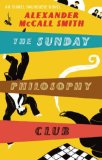Summary | Excerpt | Reading Guide | Reviews | Beyond the Book | Readalikes | Genres & Themes | Author Bio

Chapter One
Isabel Dalhousie saw the young man fall from the edge of the upper circle, from the gods. His flight was so sudden and short, and it was for less than a second that she saw him, hair tousled, upside down, his shirt and jacket up around his chest so that his midriff was exposed. And then, striking the edge of the grand circle, he disappeared headfirst towards the stalls below.
Her first thought, curiously, was of Auden's poem on the fall of Icarus. Such events, said Auden, occur against a background of people going about their ordinary business. They do not look up and see the boy falling from the sky. I was talking to a friend, she thought. I was talking to a friend and the boy fell out of the sky.
She would have remembered the evening, even if this had not happened. She had been dubious about the concert-a performance by the Reykjavik Symphony, of which she had never heard-and would not have gone had not a spare ticket been pressed upon her by a neighbour. Did Reykjavik really have a professional symphony orchestra, she wondered, or were the players amateurs? Of course, even if they were, if they had come as far as Edinburgh to give a late spring concert, then they deserved an audience; they could not be allowed to come all the way from Iceland and then perform to an empty hall. And so she had gone to the concert and had sat through a first half which comprised a romantic combination of German and Scottish: Mahler, Schubert, and Hamish McCunn.
It was a warm evening-unseasonably so for late March-and the atmosphere in the Usher Hall was close. She had come lightly dressed, as a precaution, and was glad that she had done so as the temperature in thegrand circle inevitably climbed too high. During the interval she had made her way downstairs and had enjoyed the relief of the cooler air outside, eschewing the crush of the bar with its cacophony of conversation. She would find people she knew there, of course; it was impossible to go out in Edinburgh and not see anybody, but she was not in the mood for conversation that evening. When the time came to go back in, she toyed for a few moments with the idea of missing the second half, but she always felt inhibited from any act suggesting a lack of concentration or, worse still, of seriousness. So she had returned to her seat, picked up the programme from where she had left it on the armrest next to her, and studied what lay ahead. She took a deep intake of breath. Stockhausen!
She had brought with her a set of opera glasses-so necessary even in the moderate heights of the grand circle. With these trained on the stage so far down below, she scrutinised each player one by one, an activity she could never resist in concerts. One did not stare at people through binoculars normally, but here in the concert hall it was permitted, and if the binoculars strayed to the audience once in a while, who was to notice? The strings were unexceptional, but one of the clarinettists, she noticed, had a remarkable face: high cheekbones, deep-set eyes, and a chin that had been cleaved, surely, by an axe. Her gaze dwelt on him, and she thought of the generations of hardy Icelanders, and Danes before them, that had laboured to bring forth this type: men and women who scratched a living from the thin soil of upland farms; fishermen who hunted cod in steel-grey waters; women who struggled to keep their children alive on dried fish and oatmeal; and now, at the end of all this effort, a clarinettist.
She laid aside the opera glasses and sat back in her seat. It was a perfectly competent orchestra, and they had played the McCunn with gusto, but why did people still do Stockhausen? Perhaps it was some sort of statement of cultural sophistication. We may come from Reykjavik, and it may be a small town far from anywhere, but we can at least play Stockhausen as well as the rest of them. She closed her eyes. It was impossible music, really, and it was not something a visiting orchestra should inflict on its hosts. For a short while she considered the idea of orchestral courtesy. Certainly one should avoid giving political offence: German orchestras, of course, used to be careful about playing Wagner abroad, at least in some countries, choosing instead German composers who were somewhat more . . . apologetic. This suited Isabel, who disliked Wagner.
Excerpted from The Sunday Philosophy Club by Alexander McCall Smith, pages 3-11. Copyright© 2004 by Alexander McCall Smith. Excerpted by permission of Pantheon Books, a division of Random House, Inc. All rights reserved. No part of this excerpt may be reproduced or reprinted without permission in writing from the publisher.






Your guide toexceptional books
BookBrowse seeks out and recommends the best in contemporary fiction and nonfiction—books that not only engage and entertain but also deepen our understanding of ourselves and the world around us.